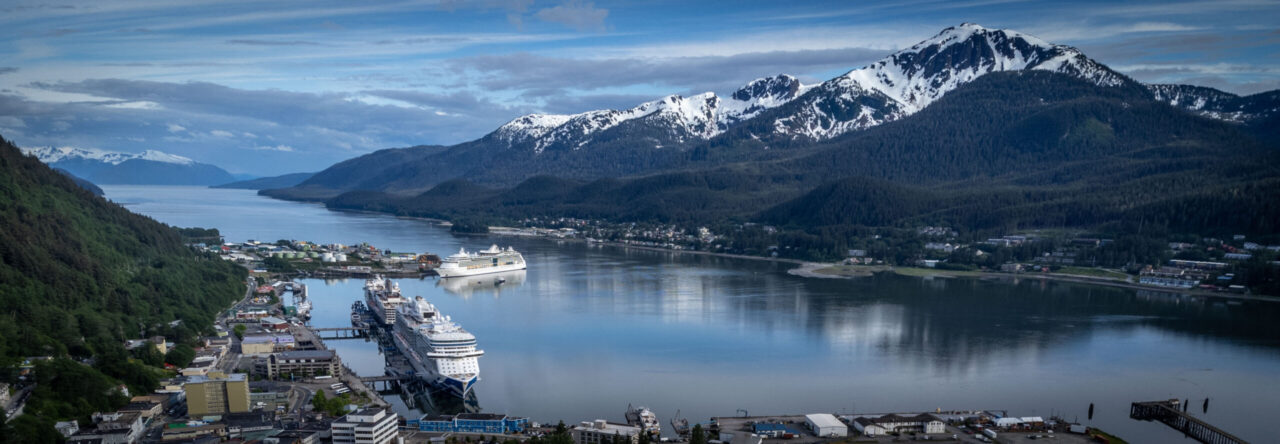
Colors of Grand Prismatic Spring
Yellowstone National Park is known for its geysers, the most famous of course being Old Faithful. We spent our second day in the park seeing as many geysers and hot springs as we could. The geyser basins are crisscrossed by boardwalk trails to allow you to see the geothermal features safely. One thing I didn’t know before visiting Yellowstone is that geysers and hot springs smell like sulfur. Looking at these photos is bringing the smell back to me!
 We started the day with the Angel Falls trail to the Grand Prismatic Spring overlook. Grand Prismatic is another iconic location in the park. It was funny, driving around the park and seeing all of the Cruise America RVs with a picture of it on the side. I’ve wanted to see Grand Prismatic since I saw a picture of it in my geography class in college. Years later, I forgot what it was called and tried to figure out where it was by googling “rainbow pond” (true story). The overlook is the best way to get a birds-eye view of the spring. The spring was very steamy when we got up there so, that was disappointing. Probably the most upsetting thing about it was going home and all my Facebook friends going to Yellowstone and posting their beautiful, clear, Grand Prismatic shots. If we had more time in the park, we probably would’ve tried again. At least the pictures from later in the day on the boardwalk (top) made up for it!
We started the day with the Angel Falls trail to the Grand Prismatic Spring overlook. Grand Prismatic is another iconic location in the park. It was funny, driving around the park and seeing all of the Cruise America RVs with a picture of it on the side. I’ve wanted to see Grand Prismatic since I saw a picture of it in my geography class in college. Years later, I forgot what it was called and tried to figure out where it was by googling “rainbow pond” (true story). The overlook is the best way to get a birds-eye view of the spring. The spring was very steamy when we got up there so, that was disappointing. Probably the most upsetting thing about it was going home and all my Facebook friends going to Yellowstone and posting their beautiful, clear, Grand Prismatic shots. If we had more time in the park, we probably would’ve tried again. At least the pictures from later in the day on the boardwalk (top) made up for it!

Emerald Spring in Norris Geyser Basin
After the hike, we headed to the Norris Geyser Basin. Two and a quarter miles of boardwalks take you around seven geysers and nine hot springs in the Norris Geyser Basin. While lesser-known, Norris is the hottest and oldest of Yellowstone’s thermal areas. Steamboat Geyser is one of the most popular features in this area and is the tallest geyser in the world. Its eruptions are unpredictable but it has begun to erupt more often in recent years.

View from Artists Paint Pots
From Norris, we made a stop at the more obscure Artist Paint Pots. While interesting to look at, these bubbling mud pots are not very photogenic. But, a walk through this area is a way to get away from the crowds you will find at the other geyser basins. It is also a good spot to get a view of the Tetons (above).

Clepsydra Geyser in the Lower Geyser Basin
Next, we headed to the Lower Geyser Basin. At twelve square miles, the lower basin is huge with the geothermal features scattered around in small groups. Mud pots, geysers, hot springs, pools, and fumaroles abound in this basin. Great Fountain Geyser is one of the highlights of the area and Clepsydra Geyser (above) is fun to photograph because of its almost constant stream of water, 10-40 feet in the air.

After Lower Geyser Basin, we figured it was late enough in the day to explore Midway Geyser Basin without too much of a crowd. Being home to Grand Prismatic Spring (right), Midway can get very crowded and parking can be near impossible in the middle of the day. After getting an acceptable view of the iconic spring, we had walked over ten miles and I was ready to head back to the Old Faithful Inn and enjoy watching Old Faithful erupt one last time before heading to bed.
Thanks for stopping by! Be sure to check back next week when I detail our drive through Grand Teton National Park! To read more about this trip, check out the Epic National Park Road Trip. To read about some of our previous trips, visit my Trips Page. If you like my photos be sure to “like” my Facebook Page and follow me on Instagram! You can purchase prints on Etsy and Fine Art America. To see inside my camera bag, check out my updated Gear Page.
Pin This:


